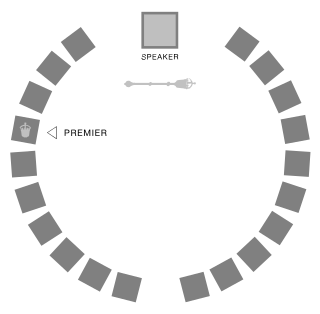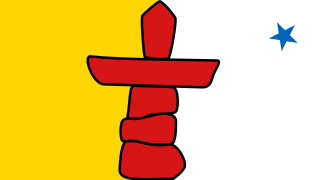The Nunavut general election, 2004 was the second general election held in the Canadian territory. It was held on February 16, 2004, to elect the 19 members of the 2nd Legislative Assembly of Nunavut.

The Legislative Assembly of Nunavut, Canada, is located in Iqaluit, and is the territory's parliament.

Kitikmeot Region is an administrative region of Nunavut, Canada. It consists of the southern and eastern parts of Victoria Island with the adjacent part of the mainland as far as the Boothia Peninsula, together with King William Island and the southern portion of Prince of Wales Island. The regional seat is Cambridge Bay.

Nunavut Arctic College is a Crown corporation that is funded by the Government of Nunavut and has several campuses and centres spread out throughout Nunavut, Canada.

The history of Northwest Territories capital cities begins with the purchase of the Territories by Canada from the Hudson's Bay Company in 1869, and includes a varied and often difficult evolution. Northwest Territories is unique amongst the other provinces and territories of Canada in that it has had seven capital cities in its history. The territory has changed the seat of government for numerous reasons, including civil conflict, development of infrastructure, and a history of significant revisions to its territorial boundaries.
The Northwest Territories division plebiscite was a stand-alone territory wide plebiscite conducted on April 14, 1982. This was the first territory wide plebiscite conducted in Northwest Territories history. The results of the plebiscite would eventually lead to the creation of Nunavut, and spawn three other plebiscites during the creation process of the new territory.

Hunter A. Tootoo is a Canadian politician serving as the Member of Parliament for Nunavut since 2015. Elected as a Liberal to the House of Commons, he was appointed Minister of Fisheries, Oceans and the Canadian Coast Guard by Justin Trudeau on November 4, 2015. Tootoo resigned from that position on May 31, 2016 to take a leave from Parliament to seek treatment for alcohol addiction. He returned by the end of July 2016 after the completion of his treatment program but remains sitting as an independent.
Elections NWT is an independent, non-partisan public agency responsible for the administration of territorial general elections, by-elections, and plebiscites in accordance with the Elections and Plebiscites Act. Elections NWT is headed by the Chief Electoral Officer, an officer of the Legislative Assembly of the Northwest Territories.
Edward "Ed" Walter Picco is a Canadian Nunavut, politician first elected in the 1995 Northwest Territories election. He was re-elected in the 1999 Nunavut election and in the 2004 Nunavut election. Picco is one of the few Canadian politicians elected to two different legislative assemblies, having been elected in 1995 to the Legislative Assembly of the Northwest Territories and in 1999 to the Legislative Assembly of Nunavut.
Titus Allooloo is a business man and former territorial level politician from Nunavut, Canada. He served as a member and cabinet Minister of the Northwest Territories Legislature through two terms from 1987 until 1995.
A plebiscite on the equal representation of men and women in the Nunavut Legislative Assembly was held on 26 May 1997 in the area of the Northwest Territories that was to be split off into the new territory of Nunavut. The proposal was rejected by 57.37% of voters, with a voter turnout of just 38.9%.

The 2013 Nunavut general election, formally the 4th Nunavut general election, was held October 28, 2013, to elect 22 members to the 4th Legislative Assembly of Nunavut. In November 2012 the assembly passed the Nunavut Elections Act 2012, stating that the writs for election drop September 23, 2013, and an election be held October 28, 2013, the proclamation was registered November 9, 2012. At the 2013 forum, held on November 15, 2013, Peter Taptuna was selected as the new Premier of Nunavut.

The Nunavut general election, 2017 was held in the Canadian territory of Nunavut on October 30, 2017 to return the members of the 5th Nunavut Legislature. The fifth general election held since the creation of the territory in 1999, it was the first election held under Nunavut's new fixed election dates law, which requires elections to be held no more than four years after the prior election.









